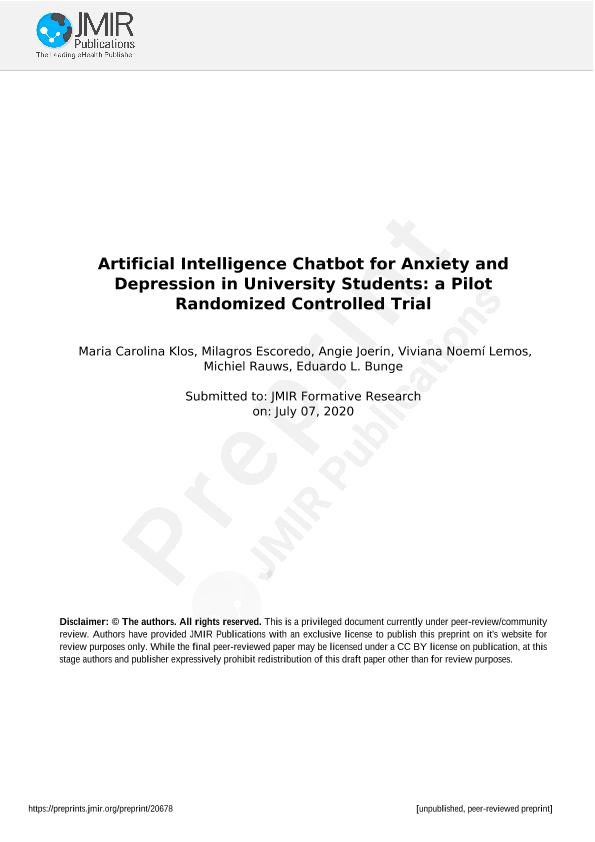Artículo
Artificial intelligence chatbot for anxiety and depression in university students: a pilot randomized controlled trial
Klos, María Carolina ; Escoredo, Milagros; Joerin, Angie; Lemos, Viviana Noemí
; Escoredo, Milagros; Joerin, Angie; Lemos, Viviana Noemí ; Rauws, Michiel; Bunge, Eduardo L.
; Rauws, Michiel; Bunge, Eduardo L.
 ; Escoredo, Milagros; Joerin, Angie; Lemos, Viviana Noemí
; Escoredo, Milagros; Joerin, Angie; Lemos, Viviana Noemí ; Rauws, Michiel; Bunge, Eduardo L.
; Rauws, Michiel; Bunge, Eduardo L.
Fecha de publicación:
07/2020
Editorial:
JMIR Formative Research
Revista:
Journal Of Medical Internet Research
e-ISSN:
2561-326X
Idioma:
Inglés
Tipo de recurso:
Artículo publicado
Clasificación temática:
Resumen
Background: The use of artificial intelligence based chatbots as an instrument of psychological intervention is emerging, however no studies have been reported in Latin America. Objective: The objective of the present study was to evaluate the viability, acceptability and potential impact of Tess, a chatbot, on symptoms of depression and anxiety in university students. Methodology: This was a pilot randomized controlled trial. The experimental condition used Tess for eight weeks and the control condition was assigned to a psychoeducation book on depression. Comparisons were conducted using Mann-Whitney U and Wilcoxon tests for depression symptoms, and Independent and Paired Samples t Tests to analyze anxiety symptoms. Results: The initial sample consisted of 181 Argentinian college students (87.2% female) ages 18 to33. A total of 39 (39%) participants in the experimental condition and 34 (41%) in the control group, provided data at week eight. There was an average of 472 (SD=249.52) messages exchanged and an average of 116 (SD=73.87) of the messages were sent from the user in response to Tess. A higher number of messages exchanged with Tess was associated with positive feedback (F2, 36=4.37; p =.02). No significant intergroup differences from baseline to week eight between the experimental group and the control group were found for depression and anxiety symptoms. However, significant intragroup differences demonstrated that the experimental group showed a significant decrease in anxiety symptoms; no differences were observed for the control group. No significant differences were found for depressive symptoms within the groups. Conclusions: Students engaged a considerable amount of time exchanging messages with Tess and positive feedback was associated with higher numbers of messages exchanged. The initial results show promising evidence for the usability and acceptability of Tess in the Argentinian population. Research on chatbots is still in its initial stages and further research is needed.
Archivos asociados
Licencia
Identificadores
Colecciones
Articulos(CIIPME)
Articulos de CENTRO INTER. DE INV. EN PSICOLOGIA MATEMATICA Y EXP. "DR. HORACIO J.A RIMOLDI"
Articulos de CENTRO INTER. DE INV. EN PSICOLOGIA MATEMATICA Y EXP. "DR. HORACIO J.A RIMOLDI"
Citación
Klos, María Carolina; Escoredo, Milagros; Joerin, Angie; Lemos, Viviana Noemí; Rauws, Michiel; et al.; Artificial intelligence chatbot for anxiety and depression in university students: a pilot randomized controlled trial; JMIR Formative Research; Journal Of Medical Internet Research; 5; 8; 7-2020; 1-28
Compartir
Altmétricas



